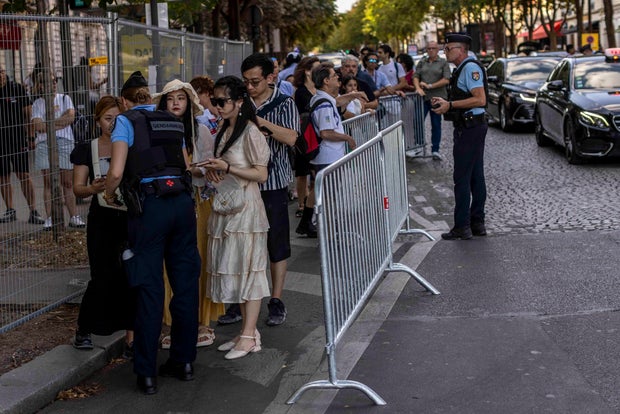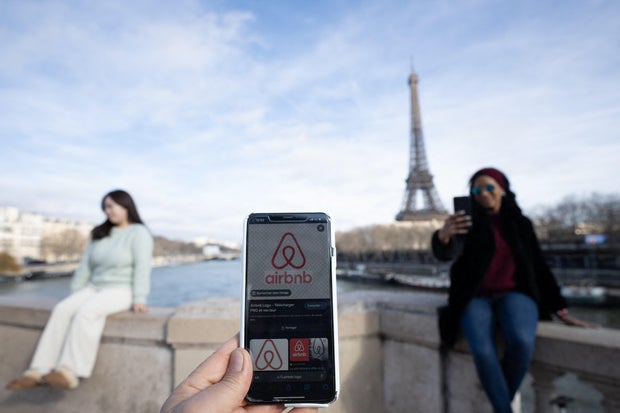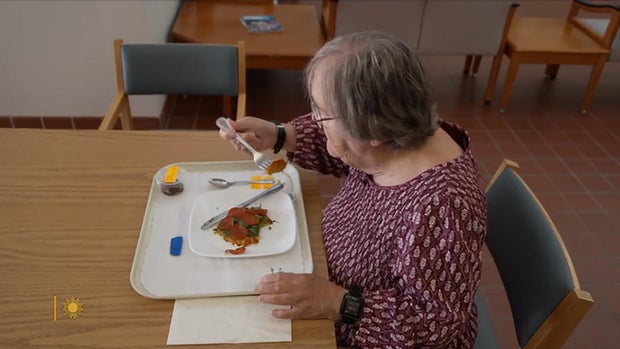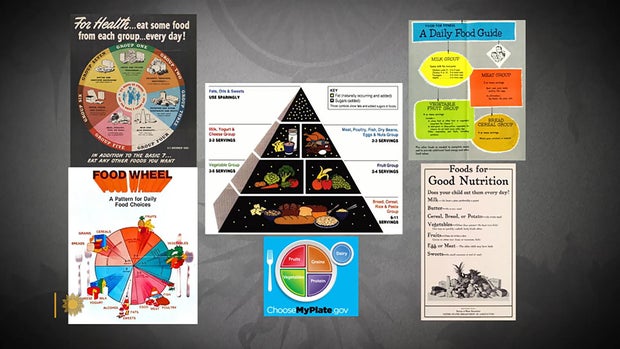CBS News
Why the 2024 Paris Summer Olympics are already an expensive nightmare for many locals and tourists

Paris — The 2024 Paris Summer Olympics open next week, and athletes from around the world have already started arriving to prepare for the competition. France, however, has been preparing for several years, and not everyone in Paris is pleased with the disruption those preparations have brought.
Some Parisians have complained for months on social media about the state of the French capital, with some warning tourists to stay away.
“If you’re planning on coming to Paris for the Olympic Games… do not come! Do not come… The city of Paris is making it hell on earth,” one resident warned in an online rant.
City officials insist the Summer Games will be a huge success, but Parisians have fled from their city in droves, and tourism, almost counterintuitively, is down.
Construction linked to the Olympics has made moving around Paris much harder and more expensive. Prices to ride the Paris Metro system have doubled, students have been kicked off campuses to make way for Olympic staff and rents have soared.
Maja Hitij/Getty
“People that were thinking about coming to Paris for holidays, most of them decided not to come because, number one, the city is very congested, number two, the prices are really high,” Gail Boisclair, who runs the Perfectly Paris property rental company, told CBS News. “The tourists just simply don’t want to deal with it.”
She said American visitors looking for a summer European vacation have largely opted to visit Spain, Britain and Ireland this year instead, and that includes some regular visitors to the City of Light.
“I have a lot of returning guests, and if they didn’t have to be here for work, they just said ‘forget 2024, we’re waiting ’til next year to come.'”
Many tourists chose to visit Paris before the Olympics, but even they have found the city unwelcoming.
First-time visitors Ian and Belinda Caulfield from Wales were surprised at how much construction there was, and how difficult it was to get around.
“I know it’s within a certain amount of the city, but if you just want to walk down the Seine, there’s a lot of obstructions,” said Ian.
Belinda said the couple found they were having to walk more than they expected because of diversions around Olympic construction sites.
Eva and Agnes from Norway also found it difficult to get where they wanted to go.
“We have traveled across the Seine over here, and it was closed, so we had to go all around a lot of buildings to get where we wanted,” said Eva.
They didn’t cancel any of their plans, but Eva said in hindsight, “it would have been better to come here next year, not this year.”
High prices for accommodation are also keeping tourists away. Hotels raised their prices more than a year ago, some asking for double the usual rates — or even higher for rooms that overlook the Seine and the area where the Opening Ceremony will take place on July 26.
MIGUEL MEDINA/AFP/Getty
Many Parisians also thought it would be a good time to cash in on expected high visitor numbers by renting out their homes. But visitor numbers are down by as much as 30%, according to some studies.
“People were thinking, oh, four times as much, five times as much, who knows,” said Boisclair. Last year, she advised owners of the rental apartments she manages to raise their rates by 30% for the Games, but no more than that.
Those who followed her advice found guests immediately, she said. Others wanted to wait to try to cash in for more.
“We can retire on the income that we’ll earn for two and a half weeks during the Olympics,” was their thinking, she said. But that gamble has not paid off.
Tens of thousands of rental apartments and hotel rooms still lie empty as the market was flooded with offers. A cursory glance at popular hotel and apartment reservation sites shows prices being slashed daily — but the offers still massively outstrip demand.
Others in Paris have found themselves homeless because of the Olympics. More than 3,000 student rooms in the capital’s university campuses were commandeered for all the police and firefighters brought in for the Games.
Michael Kappeler/picture alliance/Getty
While most students are off for the summer, several thousand were planning on staying in their rooms while on work placements in the capital or to continue with research projects. Several told the Le Parisien newspaper it was stressful having to move out and find somewhere else to live at a time when rents have soared.
Many who work in the tourism industry also got a nasty surprise this year. Some Parisian cafes and restaurants inside the restricted Olympic zones are considering closing their doors during the Games because it will be so difficult for people to get to them.
Some taxi drivers have said they’ll work the first few days of the Games at the end of July, and then decide if it’s worth staying in the city or, if things are quiet, just going on vacation for August.
Tour guide Lily Heise usually makes the majority of her annual income during the summer — but not this year.
“I was very excited about Paris hosting the Olympics and had thought it would lead to increased bookings,” she told CBS News. “But over the last two months, bookings have been down around 50%. June and July are usually among the busiest months of the year for the tourism sector in Paris. The loss of income is substantial and it’s difficult to know if tourists will be back in the autumn, once the Games are over.”
The Paris Games are expected to cost $12 billion. That’s cheap for an Olympic Games – but many in Paris feel they’ve paid a higher price themselves in other ways.
CBS News
A study to devise nutritional guidance just for you

It’s been said the best meals come from the heart, not from a recipe book. But at this USDA kitchen, there’s no pinch of this, dash of that, no dollops or smidgens of anything. Here, nutritionists in white coats painstakingly measure every single ingredient, down to the tenth of a gram.
Sheryn Stover is expected to eat every crumb of her pizza; any tiny morsels she does miss go back to the kitchen, where they’re scrutinized like evidence of some dietary crime.
Stover (or participant #8180, as she’s known) is one of some 10,000 volunteers enrolled in a $170 million nutrition study run by the National Institutes of Health. “At 78, not many people get to do studies that are going to affect a great amount of people, and I thought this was a great opportunity to do that,” she said.
CBS News
It’s called the Nutrition for Precision Health Study. “When I tell people about the study, the reaction usually is, ‘Oh, that’s so cool, can I do it?'” said coordinator Holly Nicastro.
She explained just what “precise” precisely means: “Precision nutrition means tailoring nutrition or dietary guidance to the individual.”
The government has long offered guidelines to help us eat better. In the 1940s we had the “Basic 7.” In the ’50s, the “Basic 4.” We’ve had the “Food Wheel,” the “Food Pyramid,” and currently, “My Plate.”
CBS News
They’re all well-intentioned, except they’re all based on averages – what works best for most people, most of the time. But according to Nicastro, there is no one best way to eat. “We know from virtually every nutrition study ever conducted, we have inner individual variability,” she said. “That means we have some people that are going to respond, and some people that aren’t. There’s no one-size-fits-all.”
The study’s participants, like Stover, are all being drawn from another NIH study program called All Of Us, a massive undertaking to create a database of at least a million people who are volunteering everything from their electronic health records to their DNA. It was from that All of Us research that Stover discovered she has the gene that makes some foods taste bitter, which could explain why she ate more of one kind of food than another.
Professor Sai Das, who oversees the study at Tufts University, says the goal of precision nutrition is to drill down even deeper into those individual differences. “We’re moving away from just saying everybody go do this, to being able to say, ‘Okay, if you have X, Y and Z characteristics, then you’re more likely to respond to a diet, and somebody else that has A, B and C characteristics will be responding to the diet differently,'” Das said.
It’s a big commitment for Stover, who is one of 150 people being paid to live at a handful of test sites around the country for six weeks – two weeks at a time. It’s so precise she can’t even go for a walk without a dietary chaperone. “Well, you could stop and buy candy … God forbid, you can’t do that!” she laughed.
While she’s here, everything from her resting metabolic rate, her body fat percentage, her bone mineral content, even the microbes in her gut (digested by a machine that essentially is a smart toilet paper reading device) are being analyzed for how hers may differ from someone else’s.
Nicastro said, “We really think that what’s going on in your poop is going to tell us a lot of information about your health and how you respond to food.”
CBS News
Stover says she doesn’t mind, except for the odd sounds the machine makes. While she is a live-in participant, thousands of others are participating from their homes, where electronic wearables track all kinds of health data, including special glasses that record everything they eat, activated when someone starts chewing. Artificial intelligence can then be used to determine not only which foods the person is eating, but how many calories are consumed.
This study is expected to be wrapped up by 2027, and because of it, we may indeed know not only to eat more fruits and vegetables, but what combination of foods is really best for us. The question that even Holly Nicastro can’t answer is, will we listen? “You can lead a horse to water; you can’t make them drink,” she said. “We can tailor the interventions all day. But one hypothesis I have is that if the guidance is tailored to the individual, it’s going to make that individual more likely to follow it, because this is for me, this was designed for me.”
For more info:
Story produced by Mark Hudspeth. Editor: Ed Givnish.
“Sunday Morning” 2024 “Food Issue” recipe index
Delicious menu suggestions from top chefs, cookbook authors, food writers, restaurateurs, and the editors of Food & Wine magazine.
CBS News
A new generation of shopping cart, with GPS and AI

Watch CBS News
Be the first to know
Get browser notifications for breaking news, live events, and exclusive reporting.
CBS News
“All hands on deck” for Idaho’s annual potato harvest

Watch CBS News
Be the first to know
Get browser notifications for breaking news, live events, and exclusive reporting.














